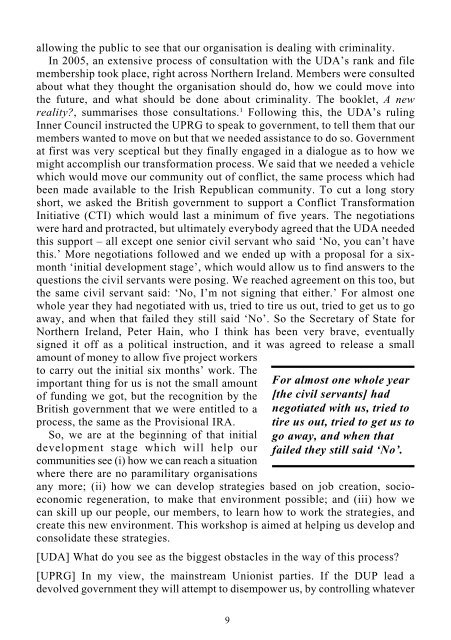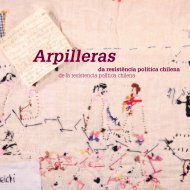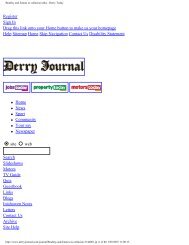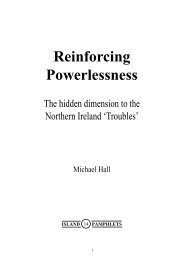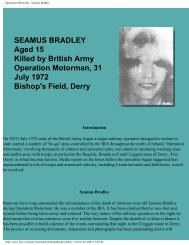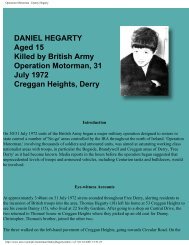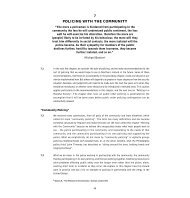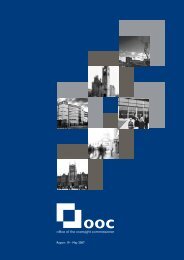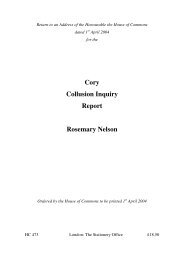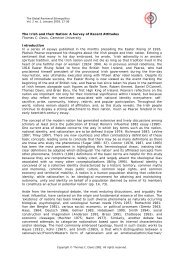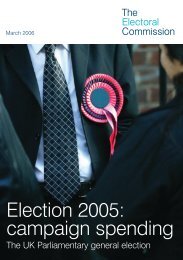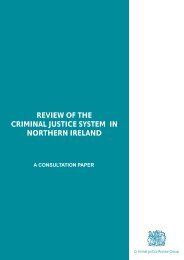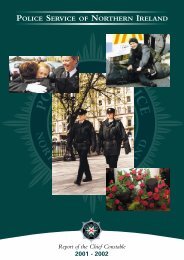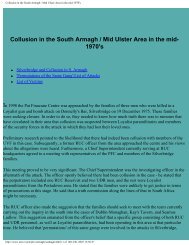Learning from others in conflict - CAIN
Learning from others in conflict - CAIN
Learning from others in conflict - CAIN
- No tags were found...
Create successful ePaper yourself
Turn your PDF publications into a flip-book with our unique Google optimized e-Paper software.
allow<strong>in</strong>g the public to see that our organisation is deal<strong>in</strong>g with crim<strong>in</strong>ality.In 2005, an extensive process of consultation with the UDA’s rank and filemembership took place, right across Northern Ireland. Members were consultedabout what they thought the organisation should do, how we could move <strong>in</strong>tothe future, and what should be done about crim<strong>in</strong>ality. The booklet, A newreality?, summarises those consultations. 1 Follow<strong>in</strong>g this, the UDA’s rul<strong>in</strong>gInner Council <strong>in</strong>structed the UPRG to speak to government, to tell them that ourmembers wanted to move on but that we needed assistance to do so. Governmentat first was very sceptical but they f<strong>in</strong>ally engaged <strong>in</strong> a dialogue as to how wemight accomplish our transformation process. We said that we needed a vehiclewhich would move our community out of <strong>conflict</strong>, the same process which hadbeen made available to the Irish Republican community. To cut a long storyshort, we asked the British government to support a Conflict TransformationInitiative (CTI) which would last a m<strong>in</strong>imum of five years. The negotiationswere hard and protracted, but ultimately everybody agreed that the UDA neededthis support – all except one senior civil servant who said ‘No, you can’t havethis.’ More negotiations followed and we ended up with a proposal for a sixmonth‘<strong>in</strong>itial development stage’, which would allow us to f<strong>in</strong>d answers to thequestions the civil servants were pos<strong>in</strong>g. We reached agreement on this too, butthe same civil servant said: ‘No, I’m not sign<strong>in</strong>g that either.’ For almost onewhole year they had negotiated with us, tried to tire us out, tried to get us to goaway, and when that failed they still said ‘No’. So the Secretary of State forNorthern Ireland, Peter Ha<strong>in</strong>, who I th<strong>in</strong>k has been very brave, eventuallysigned it off as a political <strong>in</strong>struction, and it was agreed to release a smallamount of money to allow five project workersto carry out the <strong>in</strong>itial six months’ work. Theimportant th<strong>in</strong>g for us is not the small amountof fund<strong>in</strong>g we got, but the recognition by theBritish government that we were entitled to aprocess, the same as the Provisional IRA.So, we are at the beg<strong>in</strong>n<strong>in</strong>g of that <strong>in</strong>itialdevelopment stage which will help ourcommunities see (i) how we can reach a situationwhere there are no paramilitary organisationsFor almost one whole year[the civil servants] hadnegotiated with us, tried totire us out, tried to get us togo away, and when thatfailed they still said ‘No’.any more; (ii) how we can develop strategies based on job creation, socioeconomicregeneration, to make that environment possible; and (iii) how wecan skill up our people, our members, to learn how to work the strategies, andcreate this new environment. This workshop is aimed at help<strong>in</strong>g us develop andconsolidate these strategies.[UDA] What do you see as the biggest obstacles <strong>in</strong> the way of this process?[UPRG] In my view, the ma<strong>in</strong>stream Unionist parties. If the DUP lead adevolved government they will attempt to disempower us, by controll<strong>in</strong>g whatever9


